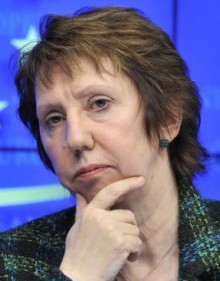Today Ukraine celebrates its National Day, the 22nd anniversary of its independence. It gives me great pleasure to send my warmest congratulations to the Ukrainian people in this important moment of national festivity. This is an occasion to reflect on Ukraine's achievements, the way forward and its vision for the future. As an independent country, Ukraine is the master of its own destiny. As a close partner, the EU has a great interest in the steps that Ukraine is taking, because the future of our relationship will depend first and foremost on Ukraine's own choices.
Ukrainehas accomplished a lot in its recent history. Above all, it has consolidated its statehood and presence on the international scene. Ukraine set an example for the entire Eastern neighbourhood when it negotiated the EU-Ukraine Association Agreement. It was also a pioneer among our Eastern partners when it decided to participate in EU-led crisis management operations. As the current holder of the OSCE Chairmanship, Ukraine is particularly well placed to build bridges. We welcome, for example, its determination to promote the negotiations on a settlement of the Transnistria issue, in the established format, with the participation of the European Union. Ukraine's pivotal role for gas transit to Europe is yet another example of Ukraine's crucial broader, international role.
At the same time, the country has huge untapped potential. As in the EU, citizens in Ukraine have the legitimate expectation that the rule of law will be systematically applied, that fundamental freedoms will be respected, that the judiciary will provide for fair legal process, that law enforcement bodies will ensure protection, that elected representatives will be held politically accountable, and that an adequate job will secure a decent life.
I believe that hard work and political will translate vision into reality. Modernisation is a longer term endeavour. It requires the correct legislative and institutional framework, but also sustained and vigorous implementation. This approach – rather than geopolitical concepts – has the potential to bring positive change to the day-to-day lives of Ukrainians, who want no more than to enjoy freedom and prosperity.
This year, the European Union and Ukraine have an unprecedented opportunity to make a major leap forward in their relations by signing the Association Agreement, which will also provide for the establishment of a Deep and Comprehensive Free Trade Area. This partnership is mutually beneficial and altogether achievable. It offers a concrete agenda for Ukraine's modernisation, for fulfilling the aspirations of Ukraine's people. However, it cannot improve the daily lives of 45 million Ukrainians unless Ukraine's institutions make an extra effort to bring themselves closer to EU standards and respect for the values we share. In December 2012, the European Union spelled out its expectations for Ukraine's progress in three critical areas: elections, judiciary, including addressing the issue of selective justice, and overall reforms set out in the jointly agreed Association Agenda, in order to enable the signing of the Association Agreement.
Four out of five parliamentary factions in Ukraine have made clear their European choice. This declaration of intent should be the catalyst for efforts from many Ukrainians to achieve the objective of building Europe in Ukraine. A litmus test for the seriousness of Ukraine's intentions will be whether Ukraine creates the right circumstances to allow for the signing of the Association Agreement and its Deep and Comprehensive Free Trade Area (DCFTA). By so doing, Ukraine would demonstrate its commitment to a longer term process of modernisation and reform. In recent months, we saw more concrete efforts aimed at reforming the judicial system and electoral legislation, and improving legislation to fight corruption. Such processes should lead to tangible progress, scrutinised by a more engaged Ukrainian civil society.
The implementation of the Association Agreement can provide a better business and investment climate in Ukraine. It can improve the quality and competiveness of Ukrainian products. The DCFTA can bring mutual economic gains and offer new opportunities for Ukrainian products and services on the European Union’s huge internal market. It will lead to increased predictability, stability, transparency and risk-reduction, creating better conditions for Ukrainian and foreign businesses. This will ultimately increase employment opportunities for Ukrainians. The genuine motivation for the Agreement should thus be clear for all to see; it is not directed against the interests of any third party.
Let me also mention that the European Union remains committed to the objective shared with Ukraine of visa-free travel in due course. We are well aware of the importance of this objective. With this in mind, the conditions for well-managed and secure mobility set out in the Action Plan on Visa Liberalisation need to be in place.
In conclusion, I hope that, in the coming months, Ukraine will successfully implement the criteria established for the signing of the Association Agreement, including by addressing selective justice and the outstanding case of this. The country also needs to show increased predictability in observing commitments and rules that are equally applicable to everybody. A comprehensive reform of the judiciary is therefore critical. The European Union will continue to assist reform efforts. Since 1991, the European Union alone has committed financial assistance to Ukraine of more than € 3 billion. And direct bilateral support from EU Member States comes on top of this. As Ukraine makes genuine progress in carrying out reforms and embracing European standards, relations between the EU and Ukraine will inevitably become deeper and stronger.







